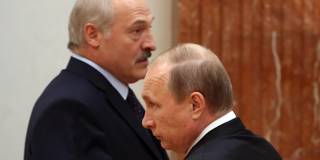After decades of maintaining a loveless geopolitical marriage, Belarusian President Aleksandr Lukashenko and Russian President Vladimir Putin are trying to figure out how each can use the other. But, with Lukashenko facing ongoing mass protests, the Kremlin clearly has much more to gain from a quid pro quo.
MOSCOW – Russian President Vladimir Putin’s public statements about the mass protests in Belarus have been at once forceful and ambiguous. For example, he says that a “law enforcement reserve” force has been prepared for potential engagement in Belarus. But that could mean personnel ranging from traffic cops and the police who break up demonstrations to the Federal Security Service (FSB, the main successor to the Soviet-era KGB) and heavily armed military units like the Rosgvardia (Russian Guard).

MOSCOW – Russian President Vladimir Putin’s public statements about the mass protests in Belarus have been at once forceful and ambiguous. For example, he says that a “law enforcement reserve” force has been prepared for potential engagement in Belarus. But that could mean personnel ranging from traffic cops and the police who break up demonstrations to the Federal Security Service (FSB, the main successor to the Soviet-era KGB) and heavily armed military units like the Rosgvardia (Russian Guard).